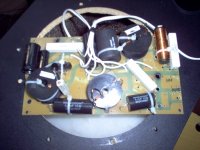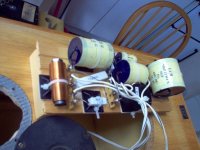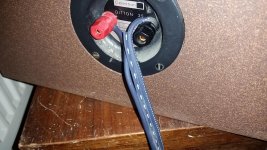Hello again. I've been loudspeakering myself, this afternoon! Sounds good. 😀
This one:
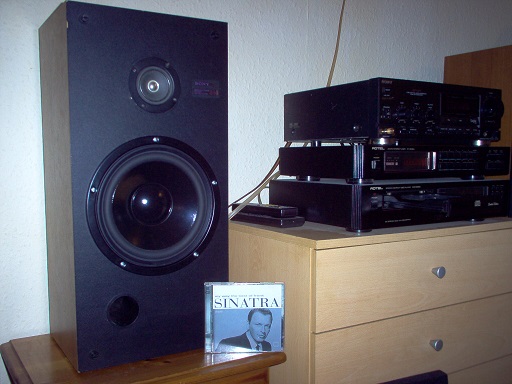
Monster crossover for a two way, but everything does something. Yes, those things on the top left are Mundorf 70V NP. Below.
Back on-topic. What is all this agonising?
You just replace capacitors with what you find in each position. Simple as that. I just measured them, but my HF2000 tweeters are 4.2R and 4.5R DC. Almost 4 ohm tweeters. Which explains how the 4uF/0.18mH/6uF filter in the Ditton 44 is not peaky. I think the HF2000 was a bit erratic on DCR.
I also think there was a tendency with Celestion to stock up on 1uF, 1.5uF and 2uF and just parallel them to get higher values. Maybe they were cheap? IDK. Blue Aran have loads of cheapish 250V caps, anyway. Being professional PA market oriented, I am sure they will be adequate for home use.
I always think the person with the speaker is in the best position to resolve all the crossover mysteries. I don't think anybody has ever done the schematic for a Ditton 22, which was a good small 3 way that my nephew owns and still likes. One opinion I do have about the Ditton 25 bass section is those three components could be replaced with a single 1mH coil for a bit of bafflestep. I'd be surprised if it sounds worse. It's kind of standard technique with big basses which roll off naturally.
This one:
Monster crossover for a two way, but everything does something. Yes, those things on the top left are Mundorf 70V NP. Below.
Back on-topic. What is all this agonising?
You just replace capacitors with what you find in each position. Simple as that. I just measured them, but my HF2000 tweeters are 4.2R and 4.5R DC. Almost 4 ohm tweeters. Which explains how the 4uF/0.18mH/6uF filter in the Ditton 44 is not peaky. I think the HF2000 was a bit erratic on DCR.
I also think there was a tendency with Celestion to stock up on 1uF, 1.5uF and 2uF and just parallel them to get higher values. Maybe they were cheap? IDK. Blue Aran have loads of cheapish 250V caps, anyway. Being professional PA market oriented, I am sure they will be adequate for home use.
I always think the person with the speaker is in the best position to resolve all the crossover mysteries. I don't think anybody has ever done the schematic for a Ditton 22, which was a good small 3 way that my nephew owns and still likes. One opinion I do have about the Ditton 25 bass section is those three components could be replaced with a single 1mH coil for a bit of bafflestep. I'd be surprised if it sounds worse. It's kind of standard technique with big basses which roll off naturally.
Attachments
Hi Steve!
I thought I was trapped in Groundhog Day, so welcome back!
Your thoughts on why Celestion used paralleled capacitors in the Ditton 25 make perfect sense.
That's a cracking new crossover board.
Is that genuine 42 strand annealed copper speaker cable I see sprouting from it?
I thought I was trapped in Groundhog Day, so welcome back!
Your thoughts on why Celestion used paralleled capacitors in the Ditton 25 make perfect sense.
That's a cracking new crossover board.
Is that genuine 42 strand annealed copper speaker cable I see sprouting from it?
I just checked and it's measley 13X 0.18mm stuff. I use 42X 0.2mm for short speaker cables, but that is a bit heavy on crossovers and internal speaker connections. Strains the crimp connectors IMO. And doesn't fit in 1.5mm PCB holes IIRC.
How much difference can it make? A coil has about 6 feet of wire in it. A voicecoil about the same.
A prettier circuit I built yesterday for a metal tweeter. 3rd order with Zobel. Sounds OK, but I always have a better time with 4th order.
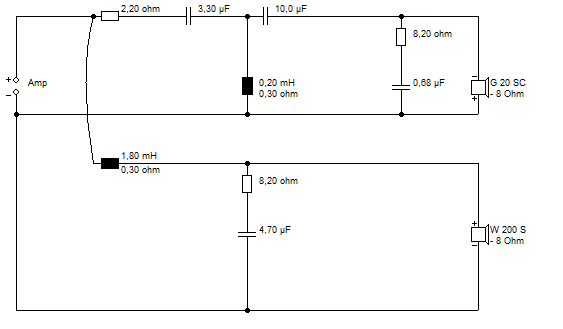
Actual build below. We decided long ago that point to point wiring is theoretically less prone to modify inductance than the Earth planes on PCBs.
There is also a notion that 2nd and 4th order circuits work better with tweeters, because the tweeter is next to a coil, which damps the FS.
I have a handy tip for the solderers. The new lead-free solder hot tips are prone to oxidise and be only fit for the bin according to teh interwebs. But I have discovered if you get them hot and scrape with a blade, while adding solder to exclude air, you can lose the layer of oxide, and they go on forever.
When soldering capacitors, you really need to get it done in about 5 seconds, or the capacitors start to melt. Especially if leads are short. Coils and resistors are tough as old boots.
Ah well. Mustn't go on. 😱
How much difference can it make? A coil has about 6 feet of wire in it. A voicecoil about the same.
A prettier circuit I built yesterday for a metal tweeter. 3rd order with Zobel. Sounds OK, but I always have a better time with 4th order.
Actual build below. We decided long ago that point to point wiring is theoretically less prone to modify inductance than the Earth planes on PCBs.
There is also a notion that 2nd and 4th order circuits work better with tweeters, because the tweeter is next to a coil, which damps the FS.
I have a handy tip for the solderers. The new lead-free solder hot tips are prone to oxidise and be only fit for the bin according to teh interwebs. But I have discovered if you get them hot and scrape with a blade, while adding solder to exclude air, you can lose the layer of oxide, and they go on forever.
When soldering capacitors, you really need to get it done in about 5 seconds, or the capacitors start to melt. Especially if leads are short. Coils and resistors are tough as old boots.
Ah well. Mustn't go on. 😱
Attachments
Agree that there's no need to go overboard with wire diameter inside a domestic loudspeaker and have never used anything more sophisticated than QED 79 strand for external cabling.
Wonder what diameter of wire is used inside the Celestion Ditton 25?
I'm not an expert on crossover design - still stuck in the Gilbert Briggs era to be honest - but learning slowly from your circuits.
Is the 2.2 ohm in the tweeter circuit for attenuation purposes or to contour the response?
P.S. Still using leaded solder - have enough to last till I shuffle off this mortal coil (pun intended!).
Wonder what diameter of wire is used inside the Celestion Ditton 25?
I'm not an expert on crossover design - still stuck in the Gilbert Briggs era to be honest - but learning slowly from your circuits.
Is the 2.2 ohm in the tweeter circuit for attenuation purposes or to contour the response?
P.S. Still using leaded solder - have enough to last till I shuffle off this mortal coil (pun intended!).
So after far to much soul searching , navel gazing, and hair pulling .. I have just put in an order. To the values found on the board, and not the schematics posted here ... For. Solen MKP 400v ... With the exception of a 600v 1uF to run in parallel with the 400v 2.2uF .. to get the 3.7 uF
Falon acustics in there blurb seem to be recomending the Alcap .. but charging more for MKP ... !!! ???
So now I have my usual buyers regret ... But that was always gonna happen 🙂
Here is the list ... Probably arrive Thursday or Friday
Item
Sku Qty Subtotal Solen 1.00uF 630V DC Polypropylene Capacitor Capacitor Tolerance 5% PPE100-+5% 2 £3.16 Solen 1.50uF 400V DC Polypropylene Capacitor Capacitor Tolerance 5% PB150-+5% 2 £3.16 Solen 2.20uF 400V DC Polypropylene Capacitor Capacitor Tolerance 5% PB220-+5% 6 £10.98 Solen 25.00uF 400V DC Polypropylene Capacitor Capacitor Tolerance 5% PB2500-+5% 2 £13.84 Subtotal £31.14 Shipping & Handling £4.50 Vat £7.13 Grand Total £42.77
Let me thank every one for getting me this far 🙂
Falon acustics in there blurb seem to be recomending the Alcap .. but charging more for MKP ... !!! ???
So now I have my usual buyers regret ... But that was always gonna happen 🙂
Here is the list ... Probably arrive Thursday or Friday
Item
Sku Qty Subtotal Solen 1.00uF 630V DC Polypropylene Capacitor Capacitor Tolerance 5% PPE100-+5% 2 £3.16 Solen 1.50uF 400V DC Polypropylene Capacitor Capacitor Tolerance 5% PB150-+5% 2 £3.16 Solen 2.20uF 400V DC Polypropylene Capacitor Capacitor Tolerance 5% PB220-+5% 6 £10.98 Solen 25.00uF 400V DC Polypropylene Capacitor Capacitor Tolerance 5% PB2500-+5% 2 £13.84 Subtotal £31.14 Shipping & Handling £4.50 Vat £7.13 Grand Total £42.77
Let me thank every one for getting me this far 🙂
On Gumtree There is some QED silver aniversary wire .. seems to retail for about 6.50p/meter .. .. I'm not sure weather to replace the old internal wiring with this .
Any Ideas ? .
I've got some sort of 4 or 5 mm squared Audiophile cable from amp to speaker at the mo ..but I don't know of its quality.
Any Ideas ? .
I've got some sort of 4 or 5 mm squared Audiophile cable from amp to speaker at the mo ..but I don't know of its quality.
Attachments
On Gumtree There is some QED silver aniversary wire .. seems to retail for about 6.50p/meter .. .. I'm not sure weather to replace the old internal wiring with this.
Have you read posts #83 and #84?
The current internal wiring will be quite sufficient for the job. Change it to QED Silver Anniversary if it makes you happy.
However, this may be regarded as overkill and is unlikely to make an audible difference!
The quality of your present audiophile cable will be adequate unless you employ extremely long runs to your amplifier. Again, change it if makes you happy!
P.S. You have ordered the correct combination of capacitors - happy soldering!
P.P.S. Thanks for your thanls!
"" Have you read posts #83 and #84?""
I have... But most of what Steve posts goes above my head .. I think part of what he said was .. a round wire won't induce as much current as a flat PCB ?
""The current internal wiring will be quite sufficient for the job.""
This I can understand , and will save me £15 Thanks 🙂
P.S. You have ordered the correct combination of capacitors - happy soldering!
LOL this doesn't add up ..It should be 3.2 ... I think its right on the order 🙂
""With the exception of a 600v 1uF to run in parallel with the 400v 2.2uF .. to get the 3.7 uF""
I have... But most of what Steve posts goes above my head .. I think part of what he said was .. a round wire won't induce as much current as a flat PCB ?
""The current internal wiring will be quite sufficient for the job.""
This I can understand , and will save me £15 Thanks 🙂
P.S. You have ordered the correct combination of capacitors - happy soldering!
LOL this doesn't add up ..It should be 3.2 ... I think its right on the order 🙂
""With the exception of a 600v 1uF to run in parallel with the 400v 2.2uF .. to get the 3.7 uF""
""When soldering capacitors, you really need to get it done in about 5 seconds, or the capacitors start to melt. Especially if leads are short. Coils and resistors are tough as old boots.""
Thanks for the tip 🙂 ... They're all needed 🙂
Thanks for the tip 🙂 ... They're all needed 🙂
But most of what Steve posts goes above my head.
 Steve knows what he means!
Steve knows what he means!Noticed the LOL and that's why I checked your capacitor combinations carefully.
For each cabinet you will end up with 2.2uF, 3.2uF, 3.7uF and 25uF - spot on!
Those look like good connectors.On Gumtree There is some QED silver aniversary wire .. seems to retail for about 6.50p/meter .. .. I'm not sure weather to replace the old internal wiring with this .
Any Ideas ? .
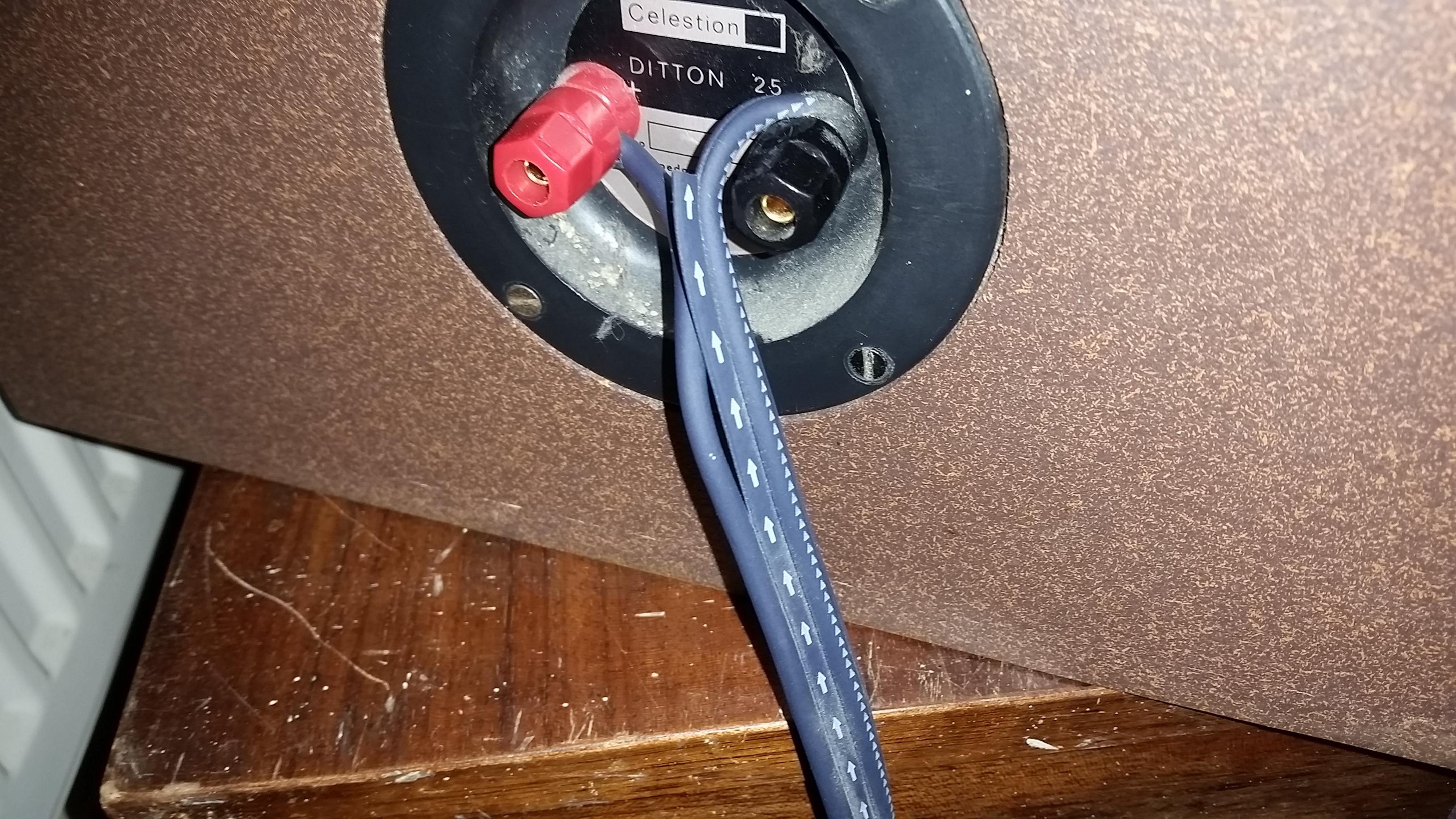
I've got some sort of 4 or 5 mm squared Audiophile cable from amp to speaker at the mo ..but I don't know of its quality.
But arrows for cable current flow in audio? Hooey! It's an alternating current!
Cables do matter. Low resistance between the amp and the crossover is obviously good. Keeps bass and mid and treble independent, and the bass tight. But if you are below, say, 0.2 ohms with a 6 ohm speaker, it should be good enough. The good engineer aims for 95% performance, because the last 5% costs a lot more. The balanced design concept which Rotel employ.
Internal wiring is such short runs, that heavy cable won't make any improvement. And is awkward. But keep it paired. That is just good practise to avoid inductance.
More soldering tips. Lead-free solder is trickier than the old leaded and fluxed stuff. It needs clean surfaces free of grease and sweat and corrosion. It is good to quickly tin components and wires before final soldering. And easier. The final joint should then flow easily.
Last edited:
I don't think landlesspeasant is going to change the internal wiring, but . . .
I would encourage him not to do so as he may run into problems.
If the wires are currently soldered to the tweeters then there is a serious risk of him damaging the tweeter connections during the desoldering/soldering process.
If the internal wiring currently uses push on connectors, then he would be faced with the difficulty of finding a source for replacements and then crimping them on to the new cable.
My advice is to leave well enough alone!
I would encourage him not to do so as he may run into problems.
If the wires are currently soldered to the tweeters then there is a serious risk of him damaging the tweeter connections during the desoldering/soldering process.
If the internal wiring currently uses push on connectors, then he would be faced with the difficulty of finding a source for replacements and then crimping them on to the new cable.
My advice is to leave well enough alone!
Those look like good connectors. But arrows for cable current flow in audio? Hooey! It's an alternating current!
Absolute hooey! They should be double ended arrows like this! <--->
Its the arrows on the wire ... that make me think its all show and no copper 🙂
""More soldering tips. Lead-free solder is trickier than the old leaded and fluxed stuff. It needs clean surfaces free of grease and sweat and corrosion. It is good to quickly tin components and wires before final soldering. And easier. The final joint should then flow easily.""
Thanks ... .I just got some cheap solder and an Iron from the pound shop 🙂
""More soldering tips. Lead-free solder is trickier than the old leaded and fluxed stuff. It needs clean surfaces free of grease and sweat and corrosion. It is good to quickly tin components and wires before final soldering. And easier. The final joint should then flow easily.""
Thanks ... .I just got some cheap solder and an Iron from the pound shop 🙂
Its the arrows on the wire ... that make me think its all show and no copper 🙂
I just got some cheap solder and an Iron from the pound shop 🙂
This is becoming an 'arrowing experience!😉
Ahhh man ... Thats really bad hahahahThis is becoming an 'arrowing experience!😉
If that Pound Shop soldering iron doesn't work you could always try this!
YouTube
All joking aside, the iron will probably work fine for occasional use.
neat trick ...
This is what Falcon say about Alcap ....
""Alcap 50V & 100V Low Loss Capacitors. Genuine Low Loss capacitors, low ESR, high ripple current. Exclusive to Falcon, specified by KEF and many other manufacturers.
Used in more critical applications than the Standard 50V, e.g. as series feed to a tweeter where high efficiency is desired. Maximum DF is lower than other types at 5% @ 1 KHz. Available in 50V & 100V DC working (depending on value). 50V Low Loss are being phased out and replaced with 100V Low Loss.
A loudspeaker which has been voiced using Alcap Low Loss capacitors or where Alcap Low Loss capacitors are replacing original black ELCAP Low Loss capacitors (marked LL) will remain true to the designer's intended sound character..""
And what they say about Solen MKP
Is not as glowing .. !! And yet I still went with MKP .. Partly cos it was possible to get the values closer to the ones I found on the board ... But If I had gone with the numbers on the schematic .. I could have used the cheaper Alcap 50v and 100v
""Solen 400V Capacitors are metallized polypropylene film capacitors offering exceptional value for money. Made by SCR to Solen’s FAST CAP AUDIO Specification, specified by HiFi World in their Kits and used by many top UK HiFi manufacturers. Falcon stocks a full range of 400V types and a large range of 630V types. Both types are for use in loudspeaker crossover networks, offering excellent value, a wide dynamic range and improved sound.""
After reading the 2 blurbs .. Which would you go with ?? Thats a question for every one

""Alcap 50V & 100V Low Loss Capacitors. Genuine Low Loss capacitors, low ESR, high ripple current. Exclusive to Falcon, specified by KEF and many other manufacturers.
Used in more critical applications than the Standard 50V, e.g. as series feed to a tweeter where high efficiency is desired. Maximum DF is lower than other types at 5% @ 1 KHz. Available in 50V & 100V DC working (depending on value). 50V Low Loss are being phased out and replaced with 100V Low Loss.
A loudspeaker which has been voiced using Alcap Low Loss capacitors or where Alcap Low Loss capacitors are replacing original black ELCAP Low Loss capacitors (marked LL) will remain true to the designer's intended sound character..""
And what they say about Solen MKP
Is not as glowing .. !! And yet I still went with MKP .. Partly cos it was possible to get the values closer to the ones I found on the board ... But If I had gone with the numbers on the schematic .. I could have used the cheaper Alcap 50v and 100v
""Solen 400V Capacitors are metallized polypropylene film capacitors offering exceptional value for money. Made by SCR to Solen’s FAST CAP AUDIO Specification, specified by HiFi World in their Kits and used by many top UK HiFi manufacturers. Falcon stocks a full range of 400V types and a large range of 630V types. Both types are for use in loudspeaker crossover networks, offering excellent value, a wide dynamic range and improved sound.""
After reading the 2 blurbs .. Which would you go with ?? Thats a question for every one

Which would you go with ?? Thats a question for every one
You shouldn't read so much importance into what is mainly sales hype.
We've covered all this - I gave you my opinion as far back as post #48!
High voltage polypropylene capacitors are the best choice, except for some vintage loudspeaker crossovers which were designed specifically to work with NP electrolytics.
- Status
- Not open for further replies.
- Home
- Loudspeakers
- Multi-Way
- Celestion Ditton 25 help needed
